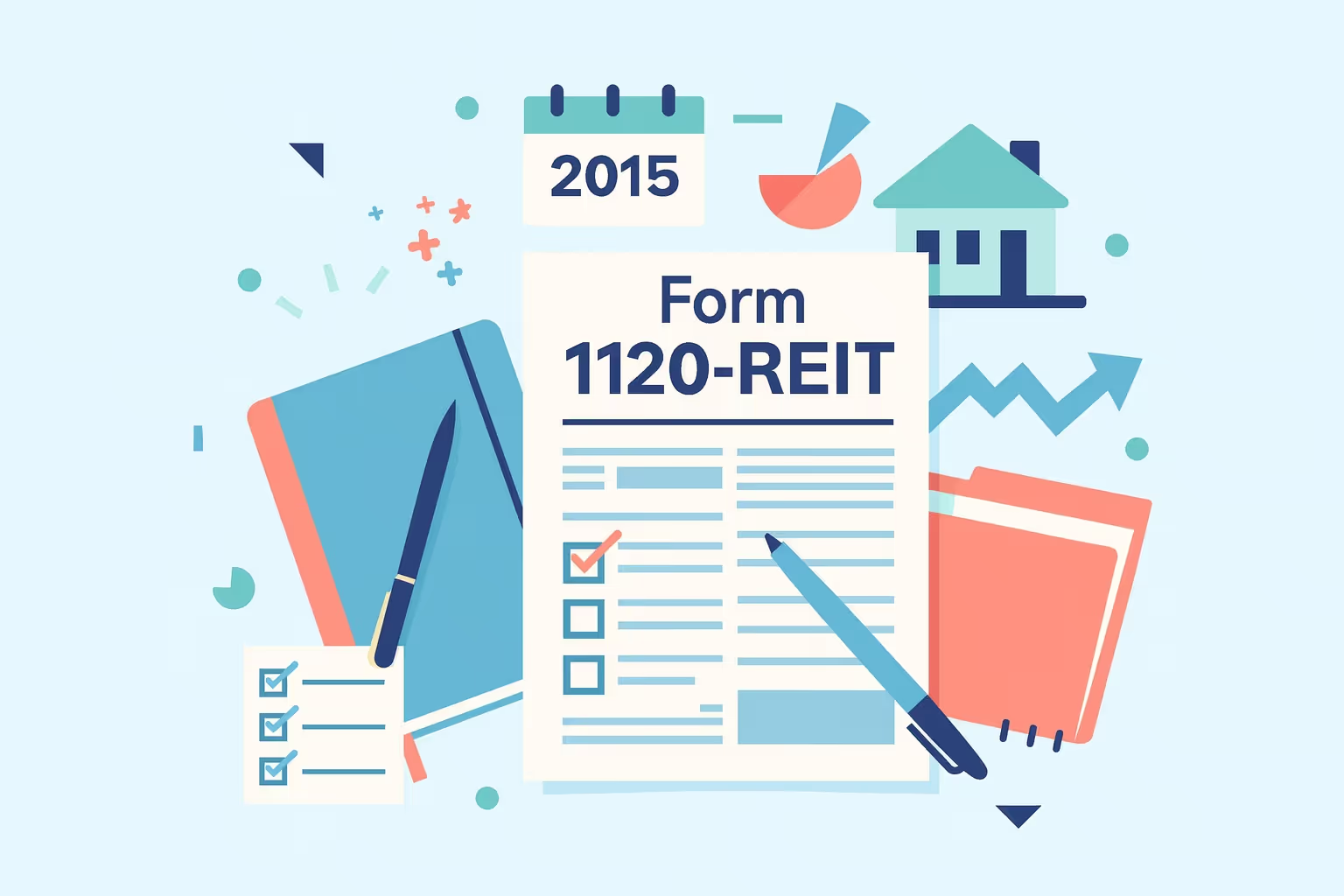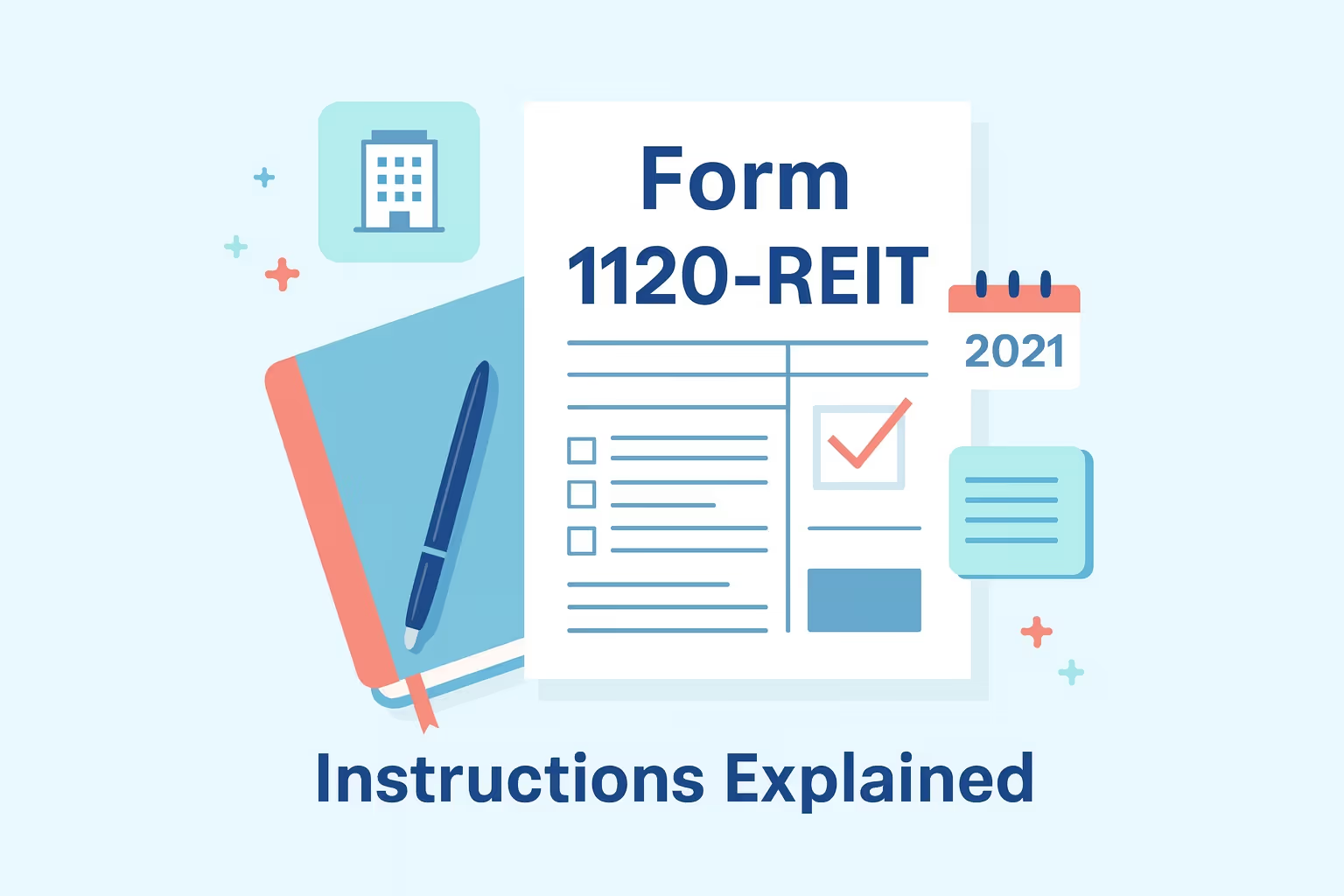
Para qué sirve el formulario 1120-REIT (2023) del IRS
Formulario 1120-REIT (2023) del IRS es la declaración de impuestos sobre la renta utilizada por los fideicomisos de inversión inmobiliaria para declarar los ingresos, las deducciones, las ganancias, las pérdidas y los créditos del año tributario. Las corporaciones, fideicomisos o asociaciones que califican como fideicomisos de inversión inmobiliaria deben presentar este formulario para cumplir con sus obligaciones tributarias federales. Ayuda a confirmar el cumplimiento de las normas del REIT, incluidas las pruebas de ingresos, las pruebas de activos y las distribuciones requeridas.
Cuándo utilizaría el formulario 1120-REIT del IRS
Utiliza el formulario 1120-REIT del IRS cuando un fideicomiso de inversión inmobiliaria debe presentar su declaración anual de impuestos sobre la renta del año tributario actual. El formulario se aplica en varias situaciones:
- Presentación anual regular: Los REIT declaran los ingresos, las deducciones, las ganancias de capital, los dividendos y otra información tributaria requerida por el IRS.
- Presentaciones tardías: El formulario se presenta después de la fecha límite cuando el REIT no presentó su declaración a tiempo.
- Declaraciones modificadas: Se necesita una enmienda cuando debe corregir datos, actualizar montos o responder a una notificación del IRS. Acceso Instrucciones del IRS, formularios de impuestos comerciales y anexos que pueda necesitar para completar o modificar el formulario 1120-REIT.
Las normas sobre los plazos de reembolso también influyen en el momento en que presentas la solicitud. Las solicitudes están limitadas por los plazos vinculados a la fecha de presentación o pago original, por lo que la presentación puntual es fundamental para proteger la elegibilidad para el reembolso.
Reglas o detalles clave para el año fiscal 2023
Varias actualizaciones afectan la forma en que un fideicomiso de inversión inmobiliaria completa su formulario 1120-REIT del IRS para el año tributario 2023. Estos detalles ayudan a garantizar que la declaración sea precisa y cumpla con los requisitos federales:
- Multa más alta por presentación tardía: Las declaraciones presentadas en 2024 se enfrentan a una multa mínima de 485 USD o al impuesto adeudado, lo que sea menor. Esta multa se aplica cuando el REIT no presenta la solicitud antes de la fecha de vencimiento requerida.
- Cambio en la deducción de comidas: La deducción temporal del 100% para las comidas de negocios finalizó y ahora solo se puede deducir el 50% de las comidas elegibles.
- Informes de la sección 179D: Las deducciones por mejoras calificadas en edificios comerciales de eficiencia energética deben declararse en la línea correcta del formulario.
- Créditos de pago electivo: Algunos créditos pueden tratarse como pagos, lo que puede aumentar los montos de los reembolsos o reducir el saldo adeudado.
Estas reglas guían la forma en que los REIT calculan los ingresos, las deducciones, los créditos y los pagos del año tributario actual.
Paso a paso (nivel alto)
Paso 1: Reunir la información requerida
Reúna la información necesaria para completar la declaración de impuestos sobre la renta. Esto incluye las transcripciones de las cuentas del IRS, los estados financieros, los detalles sobre dividendos, distribuciones, ganancias de capital, préstamos y datos sobre propiedades. También debe tener un registro de los salarios, los intereses imponibles, los pagos y las declaraciones del año anterior para el año tributario actual.
Paso 2: Complete el formulario
Use la versión 2023 del formulario 1120-REIT del IRS y siga las instrucciones. Ingresa los ingresos brutos, las deducciones, los créditos y otros detalles tributarios en las líneas correctas. Asegúrese de adjuntar todos los cronogramas necesarios y revise cuidadosamente la declaración para ver si hay errores antes de firmarla.
Paso 3: Presentar la devolución
Presente el formulario completo por correo electrónico, si está disponible, o envíelo por correo a la dirección correcta del IRS. Asegúrese de que la declaración se presente antes de la fecha límite para minimizar las multas por no presentarla. Asegúrese de incluir cualquier pago requerido y de conservar copias de todos los documentos presentados. Revisa las medidas que el IRS espera tomar al presentar declaraciones comerciales vencidas, incluidas las presentadas con el 1120-REIT tardías o faltantes.
Errores comunes y cómo evitarlos
Muchos errores de presentación en el formulario 1120-REIT del IRS pueden resultar en multas, demoras o consultas por parte del IRS. Tener en cuenta los siguientes puntos ayuda a un fideicomiso de inversión inmobiliaria a cumplir con las normas:
- Fallos en las pruebas de ingresos o activos: Los REIT deben cumplir estrictos requisitos de ingresos brutos y activos. Revise estas pruebas antes de presentar la declaración para confirmar que el fideicomiso sigue calificando.
- Deducción incorrecta de dividendos pagados: Los errores en el Anexo A pueden cambiar los ingresos imponibles. Utilice datos precisos para los dividendos y distribuciones ordinarios a fin de evitar ajustes.
- Faltan horarios o se usa un pedido incorrecto: El IRS espera una presentación completa. Adjunte todos los anexos requeridos y confirme que coinciden con las instrucciones del formulario.
- Presentaciones tardías sin soporte: Presentar la documentación después de la fecha límite sin causa razonable puede resultar en un aumento de las sanciones por no presentarla a tiempo. Aprenda cómo alivio de la pena funciona y cuando un REIT puede calificar para reducir las multas por presentación tardía para el año tributario 2023.
- Mantenimiento de registros deficiente: Los registros incompletos de ingresos, ganancias de capital, préstamos o detalles de la propiedad pueden generar errores. Mantenga los archivos organizados para confirmar cada entrada antes de firmar la declaración.
Qué sucede después de presentar la solicitud
Una vez que presente el formulario 1120-REIT del IRS, el IRS procesa la declaración según la forma en que se presentó. Las declaraciones presentadas electrónicamente generalmente se procesan más rápido, mientras que las declaraciones enviadas por correo demoran más. Las solicitudes modificadas suelen necesitar varias semanas para ser revisadas. Si el REIT debe dinero, el IRS envía una factura con opciones de pago. Puede solicitar un acuerdo de pago a plazos mediante el formulario 9465. El IRS también puede emitir avisos solicitando aclaraciones o proponiendo cambios en los montos declarados.
Preguntas frecuentes
¿Cuánto tiempo tengo para presentar una declaración de impuestos sobre la renta modificada de 2023 para los fideicomisos de inversión inmobiliaria?
Puede modificar la declaración dentro del período de solicitud de reembolso, que suele ser de tres años a partir de la fecha de presentación original o dos años a partir de la fecha en que el fideicomiso pagó los impuestos. Un profesional de impuestos puede ayudar a confirmar si el REIT tiene derecho a realizar los cambios deseados y a presentar la información correcta.
¿Qué multas se aplican si mi declaración de impuestos sobre la renta de 2023 se presenta con retraso, incluidos los problemas relacionados con la falta de presentación?
El IRS puede cobrar una multa por no presentar la declaración, en función del impuesto no pagado y del tiempo que la declaración esté vencida. Cuando envíes formularios o realices pagos en línea, busca el ícono de un candado cerrado, que indica las herramientas seguras que puedes usar para administrar tu cuenta.
¿Puedo obtener las transcripciones del IRS para mi declaración de impuestos sobre la renta de 2023 que informen las ganancias de capital y otros elementos?
Sí, puede solicitar las transcripciones en línea, por correo o por teléfono para confirmar los ingresos, los pagos y los datos declarados. Estos registros proporcionan a los usuarios un resumen financiero claro, similar a ver el historial de una cuenta de ahorros, aunque el IRS no muestre los documentos bancarios subyacentes.
¿Recibiré un reembolso si mi declaración de impuestos se presenta con retraso o si necesito modificarla?
Es posible realizar un reembolso si el REIT cumple con las reglas de elegibilidad y presenta información precisa. El plazo del reembolso depende de la tramitación del IRS, y la agencia explica sus limitaciones en las secciones denominadas «Última revisión» o «Última revisión o actualización» de su sitio web.
¿Debo modificar mi declaración de impuestos estatal si actualizo la declaración de impuestos federales sobre la renta de los fideicomisos de inversión inmobiliaria?
Muchos estados exigen una declaración actualizada cuando cambian los ingresos, las deducciones, las ganancias o los créditos federales. Revisar las normas estatales le ayuda a confirmar los plazos, comprender los posibles beneficios y distribuir respuestas precisas a las agencias tributarias estatales. Comprenda cómo el IRS maneja las demoras, las enmiendas o las incompletas devoluciones empresariales y qué desencadena avisos adicionales para los REIT.


































